Soil Health Consortia for Eastern and Southern Africa
Poor soil fertility is a key constraint to improving farm productivity and farmer livelihoods in sub-Saharan Africa (SSA). After several decades of emphasis on biological approaches to soil fertility improvement, partly because fertilizer availability was itself a major constraint, there is now wide recognition of the need to increased fertilizer use to achieve sustainable increase in crop productivity in Africa. Various technologies have been developed to improve soil health and their work is documented in scientific literature. However, very little work has been done to synthesize and disseminate this knowledge in formats suitable for use by the different actors involved in farming systems development. As part of a four year (2011-2014) initiative the Africa Soil Health Consortium (ASHC) initiative funded by the led by CABI Africa, IPNI are working with various institutions to develop knowledge products to improve knowledge on Integrated Soil Fertility Management (ISFM) at all levels of society. The project is focusing on synthesizing up-to-date information on ISFM and apply it to produce materials in a range of formats targeted at different stakeholders including policy makers, private sector actors, extension workers, farmers and students.
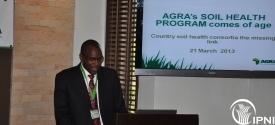 Africa Soil Health Consortia Project
Africa Soil Health Consortia ProjectThis project is working with the key stakeholders along the agricultural value chain in 8 Eastern and Southern Africa countries to promote consolidation and dissemination of ISFM information.Project c ...
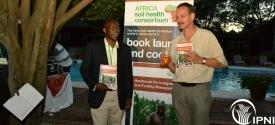 Africa Soil Health Consortium (ASHC)
Africa Soil Health Consortium (ASHC)Poor soil fertility is a key constraint to improving farm productivity and farmer livelihoods in sub-Saharan Africa (SSA). After several decades of emphasis on biological approaches to soil fertility ...
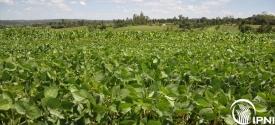 Boosting soybean production for improved food security and incomes in Africa
Boosting soybean production for improved food security and incomes in AfricaDespite growing productivity in many parts of the world, the average crop yields in sub-Saharan Africa (SSA) have stagnated at less than 30% of the regional potential. The low yields in this region ha ...
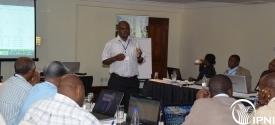 Building Capacity for Nutrient Management Data Analysis
Building Capacity for Nutrient Management Data AnalysisIPNI building capacity for ISFM data management and analysis.
In sub-Saharan Africa (SSA), the yields of the main cereal crops have stagnated at less than 25% of potentially attainable yields while the per capita food production has continued to decrease over th ...
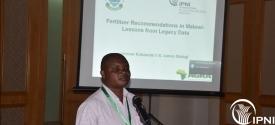 Initiation of a fertilizer stakeholder forum for Eastern and Southern Africa
Initiation of a fertilizer stakeholder forum for Eastern and Southern AfricaIPNI in collaboration with AGRA and other local and international organizations initiated a fertilizer stakeholder forum for Eastern and Southern Africa.
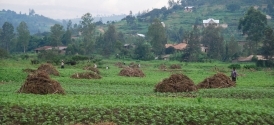 Integrated Soil Fertility Management
Integrated Soil Fertility ManagementIntegrated Soil Fertility Management (ISFM) is a fundamental concept to improve crop productivity in smallholder farming systems in a sustainable manner. ISFM encompasses the use of improve crop varie ...
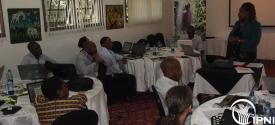 IPNI-AGRA Soil Health Consortia Planning Meeting Held at the Naivasha Country Hotel, Kenya
IPNI-AGRA Soil Health Consortia Planning Meeting Held at the Naivasha Country Hotel, KenyaSoil Health Consortia Activities
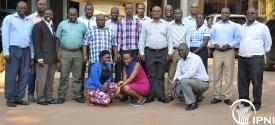 IPNI and Partners Building Capacity of Kenyan, Rwanda and Tanzania Fertilizer Companies
IPNI and Partners Building Capacity of Kenyan, Rwanda and Tanzania Fertilizer CompaniesThrough support of the Alliance for a Green Revolution in Africa (AGRA), the International Plant Nutrition Institute (IPNI) has trained over 60 fertilizer company agronomists and other fertilizer stak ...
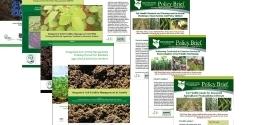 IPNI Led Soil Health Consortia Disseminates Information to Stakeholders in SSA
IPNI Led Soil Health Consortia Disseminates Information to Stakeholders in SSAA partnership between IPNI and national agricultural actors in consortia countries Kenya, Uganda, Tanzania, Ethiopia, Mozambique, Rwanda, Zambia & Malawi has yielded a series of demand driven books/ma ...
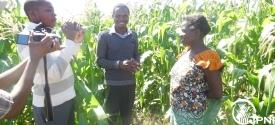 IPNI Partnered with CABI and Soil Health Consortia of Malawi to Train Journalists and Extension Workers in Malawi
IPNI Partnered with CABI and Soil Health Consortia of Malawi to Train Journalists and Extension Workers in MalawiIPNI partnered with CABI, AGRA and the Soil Health Consortium of Malawi to train extension workers and journalist in Malawi on best communication strategies for disseminating ISFM technologies.
 IPNI takes center stage in discussing Africa food production solutions at the Africa Green Revolution Forum, 2014
IPNI takes center stage in discussing Africa food production solutions at the Africa Green Revolution Forum, 2014The African Green Revolution Forum (AGRF) brings together African Heads of State, Ministers, farmers, private sector, financial institutions, NGOs, civil society, scientists, and other stakeholders to ...
IPNI SSA program has unveiled 9 consortia websites through the AGRA funded Country level Soil Health Consortia project to disseminate information on soil health, fertilizer recommendations, crop respo ...
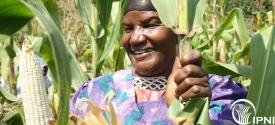 Launch of Country Soil Health Consortia Regional Website
Launch of Country Soil Health Consortia Regional WebsiteWe are pleased to announce the launch of our new website for the AGRA Country-level Soil Health Consortia Project: www.soilhealthconsortia.org. The project operates in Africa under the leadership of I ...
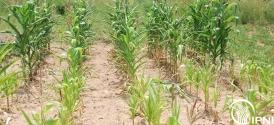 Pigeon peas work for smallholder African farmers in multiple ways
Pigeon peas work for smallholder African farmers in multiple waysOver 20% of residents of sub-Sahara Africa live below the poverty line. They are therefore unable to feed themselves and get access to other basic needs. Even in situations where they have access to l ...
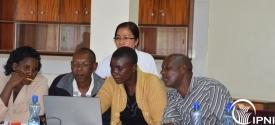 Site-Specific Nutrient Management Recommendations for Increased Maize Productivity in Kenya
Site-Specific Nutrient Management Recommendations for Increased Maize Productivity in KenyaCurrent fertilizer recommendations in Kenya are mainly based on agro – ecological zones and not soil fertility variations. IPNI’s Nutrient Expert for Hybrid Maize (NE) decision suppotr tool aims at su ...
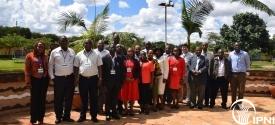 The Country Level Soil Health Consortia Moving Forward
The Country Level Soil Health Consortia Moving ForwardThe Country level Soil Health Consortia held a workshop at the Oak Place Conference and Training Centre, Nairobi in November, 2015. The workshop sought to build capacity of the project coordinators on ...
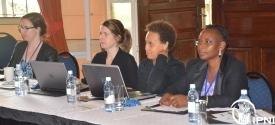 Third Consortia Annual Planning meeting and Training Workshop
Third Consortia Annual Planning meeting and Training WorkshopThe Country Soil Health Consortia held its second planning meeting and training from the 17th to the 20th February 2015. The meeting focused on progress, training on database management using the aWhe ...
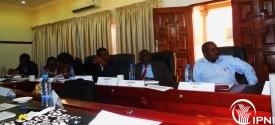 Training of Agricultural Scientists and Journalists in Zambia
Training of Agricultural Scientists and Journalists in ZambiaThe IPNI SSA program together with its partners trained Zambia lead scientists and journalists on experimental designs, data collection/quality control, data analysis, development of appropriate data ...
